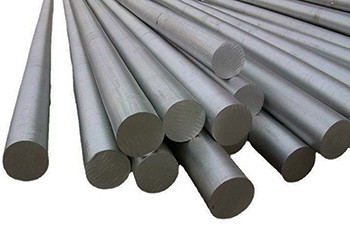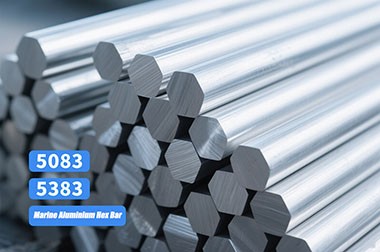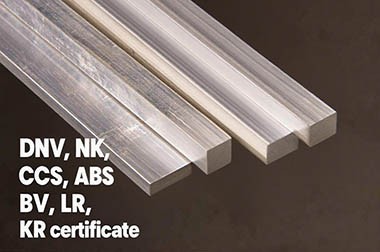5383 H112 Aluminum
5383 H112 aluminum is a corrosion-resistant, medium-strength alloy with excellent formability, making it ideal for marine applications. It is also cost-effective for structural components exposed to harsh environments.
5383 is a high-strength marine-grade aluminum alloy commonly used in applications where corrosion resistance is critical, such as in marine environments and structural components exposed to seawater.
The alloy belongs to the 5000 series and is primarily composed of aluminum and magnesium. The alloying elements in 5383 offer excellent stress corrosion cracking resistance and general corrosion resistance, particularly in saltwater.
Temper H112 5383
The H112 temper refers to aluminum that has undergone partial processing or strain, but has not been fully heat-treated like other tempers (such as T6). "H" indicates that it has undergone some form of cold working (such as rolling or drawing), and "112" signifies that the alloy's strain hardening is limited, and it is in a state with very low heat treatment.
It is a form of F (fabricated state) tempering, with slight strain hardening potential under specific conditions.
5383 H112 Aluminum Mechanical Properties
| Property | Value |
| Elastic Modulus (x 10^6 psi) | 9.9 |
| Elongation at Break (%) | 12 |
| Fatigue Strength (x 10^3 psi) | 20 |
| Poisson's Ratio | 0.33 |
| Shear Modulus (x 10^6 psi) | 3.7 |
| Shear Strength (x 10^3 psi) | 28 |
| Tensile Strength: Ultimate (x 10^3 psi) | 47 |
| Tensile Strength: Yield (x 10^3 psi) | 23 |
5383 H112 Aluminum Thermal Properties
| Property | Value |
| Latent Heat of Fusion (J/g) | 390 |
| Maximum Temperature: Corrosion (°F) | 150 |
| Maximum Temperature: Mechanical (°F) | 400 |
| Melting Completion (Liquidus) (°F) | 1200 |
| Melting Onset (Solidus) (°F) | 1010 |
| Specific Heat Capacity (BTU/lb-°F) | 0.22 |
| Thermal Conductivity (BTU/h-ft-°F) | 72 |
| Thermal Expansion (µm/m-K) | 24 |
5383 H112 Aluminum Electrical Properties
| Property | Value |
| Electrical Conductivity: Equal Volume (% IACS) | 29 |
| Electrical Conductivity: Equal Weight (% IACS) | 97 |
5383 H112 Aluminum Alloy Composition
| Element | Content Range |
| Aluminum (Al) | 92 to 95.3 |
| Chromium (Cr) | 0 to 0.25 |
| Copper (Cu) | 0 to 0.2 |
| Iron (Fe) | 0 to 0.25 |
| Magnesium (Mg) | 4.0 to 5.2 |
| Manganese (Mn) | 0.7 to 1.0 |
| Silicon (Si) | 0 to 0.25 |
| Titanium (Ti) | 0 to 0.15 |
| Zinc (Zn) | 0 to 0.4 |
| Zirconium (Zr) | 0 to 0.2 |
| Residuals | 0 |
5383 H112 Aluminum Corrosion Resistance
The 5383 alloy is specifically designed to provide excellent corrosion resistance in marine environments due to its high magnesium content. It performs well in saltwater and is resistant to general corrosion and stress corrosion cracking, making it ideal for ships, vessels, and offshore structures.
Applications of 5383-H112 Aluminum
Marine Applications
5383-H112 Aluminum is particularly well-suited for marine applications, such as the construction of ships, vessels, offshore structures, and other marine environments where corrosion resistance is a priority. Its exceptional resistance to seawater corrosion ensures long-lasting durability, making it ideal for hulls, decks, and other components exposed to harsh marine conditions.
Transportation
5383-H112 Aluminum can also be used in lightweight transportation structures that require a balance of strength and resistance to environmental wear. Its corrosion resistance and moderate strength make it an excellent choice for vehicles and transportation-related applications exposed to weathering and mechanical stresses, such as frames, panels, and other structural elements.
Marine Hardware
5383-H112 Aluminum is commonly used in marine hardware, including piping, hulls, tanks, and structural frames on ships and boats. The alloy's superior corrosion resistance in saltwater environments makes it an ideal material for components that need to withstand constant exposure to seawater while maintaining structural integrity over time.
5383 H112 Aluminum Advantages and Disadvantages
Advantages of 5383 H112 Aluminum
| Advantage | Description |
| Corrosion Resistance | 5383-H112 Aluminum offers outstanding resistance to both general corrosion and stress corrosion cracking. This makes it particularly well-suited for applications in harsh environments, such as marine and offshore conditions, where exposure to saltwater and other corrosive agents is a constant concern. |
| Moderate Strength | 5383-H112 Aluminum provides good strength for structural components. While not as strong as some high-strength alloys, its combination of strength and formability makes it a reliable choice for applications where moderate strength is sufficient, such as in marine and transportation structures. |
| Formability | Due to its moderate strength and elongation properties, 5383-H112 Aluminum can be easily formed into complex shapes. This makes it ideal for manufacturing intricate parts and components that require a balance of strength, ductility, and ease of processing, particularly in marine and lightweight structural applications. |
| Cost-Effectiveness | Compared to other high-strength alloys, 5383-H112 Aluminum is relatively cost-effective for marine applications. Its excellent corrosion resistance and moderate strength allow it to be used in demanding environments without the higher material costs associated with other stronger alloys, making it a more economical choice for shipbuilding and other maritime industries. |
Disadvantages of 5383 H112 Aluminum
Limited heat treatment: The H112 temper limits heat treatment capabilities, meaning it cannot achieve the higher strengths of other tempers (such as T6).
Medium strength: While it provides sufficient strength for many applications, it does not match the strength-to-weight ratio of alloys like 7075 or 7050, making it unsuitable for high-stress structures.
5383-H112 aluminum offers a good combination of corrosion resistance and medium strength, making it a valuable material for marine environments and other applications where corrosion is a primary concern. Its temper (H112) ensures it retains some flexibility and formability but lacks the full heat treatment capabilities found in other tempers, thus limiting its ultimate strength. Nevertheless, it remains an excellent choice for marine frames, piping, shipbuilding, and similar applications where longevity and reliability are crucial.
Recommended for you
-
5383 marine grade aluminum plate has excellent corrosion resistance and high strength. Aluminum alloy 5383 is commonly used in shipbuilding and other maritime structures where durability and resistance to salt water corrosion are critical.
-
5383-H321 aluminum has high strength and excellent corrosion resistance, making it suitable for high-load marine applications, especially in environments that require resistance to intergranular corrosion and exfoliation corrosion.
-
5383-H116 aluminum offers good corrosion resistance through specific heat treatment and cold working, making it suitable for light-load marine applications, especially for long-term use in seawater environments.
-
5383 H34 aluminum alloy is a high-strength aluminum alloy that has undergone strain hardening and stabilization treatments, offering excellent corrosion resistance and weldability. It is widely used in marine, transportation, and construction fields.
-
5383-H32 Aluminum is an aluminum alloy that has undergone strain hardening and stabilization treatment, belonging to the aluminum-magnesium alloy series. The "H32" temper indicates that the alloy has been strain-hardened through cold working and then stabilized by appropriate heat treatment, with strength lying between the annealed (O) and full-hard (H38) states.
-
5383-H111 aluminum alloy is a type of aluminum alloy, which undergoes specific heat treatment and mechanical processing to be in the H111 condition. This alloy is widely used in environments that require good corrosion resistance and moderate strength.
-
5383-O aluminum alloy is the annealed (O condition) version of 5383 aluminum. It belongs to the aluminum-magnesium alloy series and has excellent corrosion resistance, particularly outstanding in marine environments.
Other content readers are interested in
-
5083 5383 O H112 Marine Grade Aluminum Bars
5083 5383 O H112 Marine Grade Aluminum Bars are certified by CCS, DNV, NK, CCS, ABS, BV, LR, KR and other classification societies, and their quality fully complies with world marine grade standards.
-
5083 5383 Marine Grade Aluminium Hex Bar
The 5083 and 5383 aluminum hex bars produced by Haomei comply with multiple international and industry standards to ensure product quality and performance meet global application requirements.
-
5083 5383 O H112 Marine Aluminum Square Bar
Haomei Aluminum is capable of producing marine-grade 5083 and 5383 aluminum square bars in O and H112 tempers, certified by major international classification societies including DNV, NK, CCS, ABS, BV, LR, and KR.
Recommended for you
-
5052 marine aluminum alloy is a high-strength, corrosion-resistant, easy-to-process and weld aluminum alloy, which is widely used in the manufacture of ships and marine structures.
-
5083 is basically used to manufacture ship hulls because of its relatively high strength and good corrosion resistance.
-
5059 aluminum is both a high-magnesium and high-zinc alloy, offering excellent corrosion resistance and fire resistance.
-
5086 aluminum alloy is irreplaceable in hull and deck applications in marine operating environments due to its unique seawater corrosion resistance, excellent low-temperature toughness, and good weldability.
-
5383 aluminum offers excellent fatigue resistance and crack resistance, and its unique properties make it irreplaceable in the design of high-speed vessels and marine structures that require long-term fatigue resistance.
-
5456 aluminum, with its unique high strength, exceptional fatigue resistance, and resistance to stress corrosion cracking, is irreplaceable in heavy-duty hull structures.
-
5754 aluminum is a medium-to-high strength alloy with excellent weldability, a low tendency for welding cracks, and high strength in both the weld joint and the crystalline metal.
More content of interest to readers
5383-O Aluminum vs. 5456-O Aluminum 5383-H32 Aluminum vs. 5456-H32 Aluminum 5383-H111 Aluminum vs. 5456-H111 Aluminum 5383-H116 Aluminum vs. 5383-H321 Aluminum 5383 Aluminum vs. 5456 Aluminum 5383-H112 Aluminum vs. 5456-H112 Aluminum 5383 Aluminum Hot Rolling Process 5083 vs 5383 Aluminum Alloys: Which is Better for Your Project?
You might be interested in: Marine Aluminum 5383 5 Series Marine Aluminum Aluminum for Boat Aluminum for Shipbuilding



